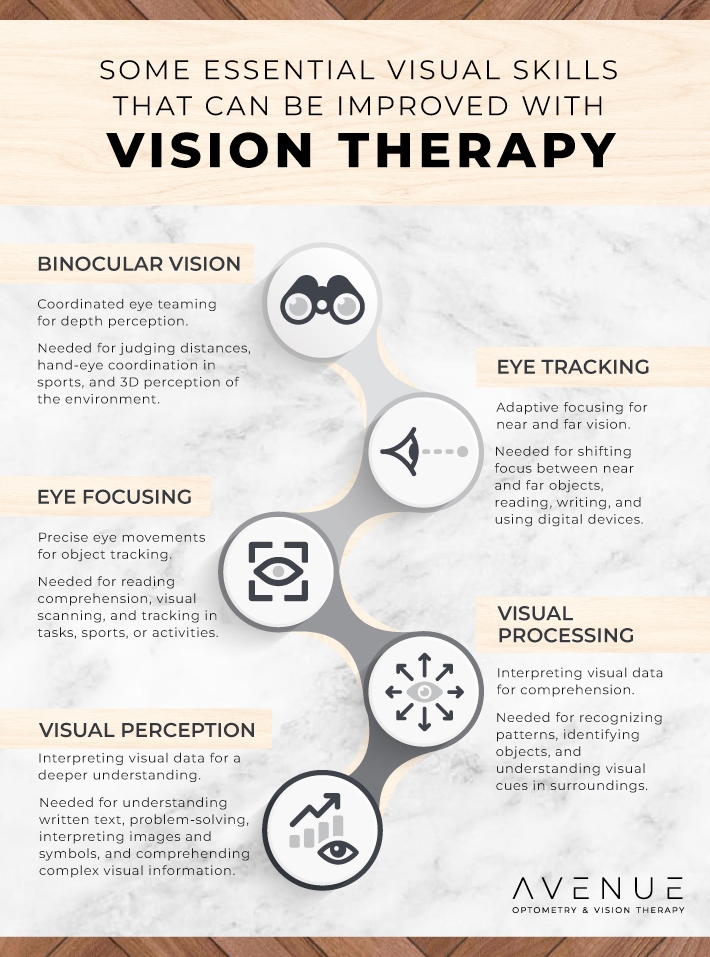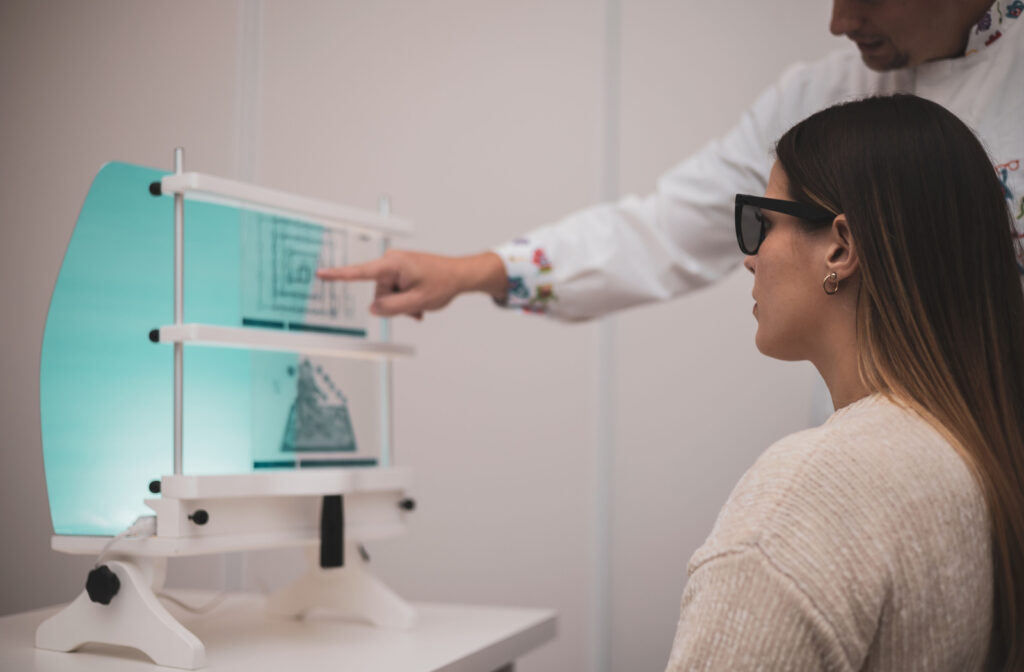Your vision is much more complicated than you may think it is. It’s one of your most important senses and helps you explore and understand your world in 3D.
Some people’s vision may not develop or function properly, impacting academic performance, sports, work productivity, and social interactions. Vision problems can particularly affect children because they rely on their vision to learn and grow.
Vision therapy can help. You can experience long-term results as long as you perform vision therapy consistently and complete your program successfully.
What Is Vision Therapy?
Vision therapy is an evidence-based personalized treatment plan developed by an optometrist to help improve essential visual skills. Its primary goal is to improve how the eyes and brain work together.
While it’s natural to think of your vision as how well you see, it encompasses your eyesight and how your brain decodes the world around you. This complex process involves your brain, eyes, and muscles working together to form your essential visual skills.
These visual skills include but are not limited to:
- Visual acuity (eyesight)
- Binocular vision function (eye teaming)
- Accommodation (eye focusing)
- Oculomotor functioning (eye tracking)
- Visual perception
- Visual processing
- Depth perception
Vision therapy isn’t about strengthening your eye muscles—they’re already incredibly strong. It’s about changing and enhancing how you process and interpret visual information to make it more comfortable and efficient.
Who Can Benefit from Vision Therapy?
Both children and adults can benefit from vision therapy. It can effectively treat many conditions, including:
- Amblyopia (lazy eye)
- Strabismus (eye turn)
- Convergence insufficiency (eyes don’t work together when looking at close objects)
- Accommodative disorders (difficulty focusing on near objects)
- Visual processing disorders
- Dyslexia
- Stereo vision problems
- Blurred vision
It can also help you heal after a traumatic brain injury.
Vision therapy can improve reading and comprehension, improve hand-eye coordination, enhance sports performance, increase productivity and efficiency at work or school, and reduce eye strain and fatigue.
What Can I Expect from Vision Therapy?
Vision therapy involves a series of specialized activities that target specific visual skills. It’s highly customized, so no 2 programs will look the same. There is no standardized set of exercises or activities, and vision therapy is not a one-size-fits-all approach.
Vision Therapy Program
A typical vision therapy program begins with a diagnostic assessment to identify the visual skills and areas that need attention. Then, working closely with you or your child, your eye doctor will formulate a treatment plan. They’ll oversee the program from beginning to end, and you’ll be given some activities to perform in the office and some to complete at home.
Progress Checks
Your eye doctor will perform a progress check every 10 sessions to measure improvements and discuss the next steps. They may modify your treatment plan based on your progress and performance. You may require more sessions or an at-home maintenance plan, depending on your situation.
Among more traditional activities, we invest in vision therapy technology, including the Optics Trainer and the RightEye Sensorimotor System.

Why Doesn’t Vision Therapy Need to Be Repeated?
When we equate vision therapy with eye-strengthening exercises, it sounds like we’re building the eyes’ muscles like how we build muscles when we go to the gym. But this isn’t an accurate analogy.
Improving visual skills and enhancing the communication between the eyes and brain is more like learning to tie your shoelaces. Once you’ve learned, you can tie your shoelaces even if it’s been a while—it becomes an automatic and enduring skill.
If vision therapy is done consistently and with a commitment to see it through to the end, it can provide long-lasting results. Why? Because of neuroplasticity.
What Is Neuroplasticity?
Neuroplasticity refers to the brain’s ability to reorganize and adapt by forming new neural connections throughout life in response to learning, experience, or environmental changes. When undergoing vision therapy, the brain learns new patterns and reinforces specific neural pathways related to vision and eye coordination.
Vision therapy stimulates the brain’s visual system, encouraging it to adapt and rewire itself to address vision-related challenges. As you engage in these exercises, your brain learns to process visual information more efficiently and coordinate your eyes better.
Once these neural connections are established and your visual system is retrained to function better, the improvements are relatively enduring. The brain retains the learned skills and adaptations, often making the need for ongoing therapy unnecessary for many. And every time you use your eyes and brain to read, learn, or play sports, you reinforce these new visual skills.
Explore Vision Therapy
Vision therapy isn’t just about temporary fixes; it’s a journey toward lasting change.
Children who struggle with reading, learning, or focusing in school can improve the visual skills they need for academic success and a brighter future. Adults facing challenges with prolonged screen use, eye strain, or difficulties with visual focus can enhance their productivity, efficiency, and overall comfort in daily activities with vision therapy. Whether it’s for your child or yourself, take the first step toward a clearer, more comfortable vision. Book an appointment at Avenue Optometry & Vision Therapy.




